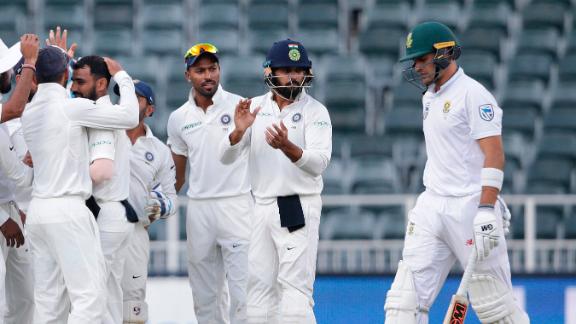India 187 (Kohli 54, Pujara 50, Rabada 3-39) and 247 (Rahane 48, Kohli 41, Bhuvneshwar 33) beat South Africa 194 (Amla 61, Philander 35, Bumrah 5-54, Bhuvneshwar 3-44) and 177 (Elgar 86*, Amla 52, Shami 5-28) by 63 runs
Scorecard and ball-by-ball details
India couldn't out Dean Elgar at all, but found a way around him to complete their third Test win in South Africa. He was ridiculed on the third evening for a short ball that hit him in the face and caused an interruption in the play, but Elgar tried his darnedest - in vain - to deny India. The visitors were efficient and ruthless even as Elgar and Hashim Amla went more than half the day without losing a wicket and added 119 of the 241 required for the second wicket. India waited and waited for the first breakthrough without giving away free runs, and once the wicket came they swooped in on the kill. The last nine wickets fell for 53 runs.
As at Lord's 2014, Ishant Sharma began the slide with a mid-afternoon spell of 7-2-15-2, but here the load was shared. His victims were big: Amla and Faf du Plessis. Jasprit Bumrah was equally impressive in his nine-over spell that followed up with wickets of AB de Villiers and Quinton de Kock. Once the two were taken off, Mohammed Shami came back from an average morning with quick, full and accurate bowling to run through the tail.
This was one of India's great wins in Test cricket as they came here beleaguered, having lost the series, and were presented with a treacherous surface. They got most of their selections right, made the bold move of batting first, batted with extreme courage and determination with contributions all around, including a couple of 30s from Bhuvneshwar Kumar.
Having set South Africa 241, they would have looked at an easy job, but there were hiccups. Play was suspended 19 minutes before stumps on the third evening as the umpires were concerned about the players' safety. After meetings, it was decided the pitch would be given a chance on the fourth morning, but overnight and early-morning rain pushed India's quest for a win back by an hour.
The pitch did show signs it had settled down a little with the uneven bounce becoming a lesser concern for the batsmen than the seam movement. Elgar took eight blows on the body, including four on the third evening. Amla was rapped on the gloves by length balls a couple of times. Between them they were beaten 26 times, but they kept batting on. Elgar had to keep getting attention on his forearm. Amla wore reinforced gloves. Inch by inch they took South Africa closer.
Elgar showed a lot of ticker in not getting perturbed by the number of blows he took. He showed great judgement in leaving the ball, didn't follow the ones that seamed away from him, and kept nudging away ones and twos. There were a few lucky runs between the slips and the gullies, but you need that in these highly unusual circumstances and conditions.
Amla was more in control of what he was doing, shuffling well across to know what lines to leave and then also opening up the leg side for runs. India tried going behind his legs, but his bat kept coming down in time. The punch to balls higher than his waist, a shot almost unique to Amla, continued to be his friend. In his 40s, when Amla got stuck and scored just two runs off 39 balls, the punch came to his rescue and saw him through to a second fifty in the match.
Elgar's method was different. When India put together a spell of 25 balls for just two runs, he ended it with a hoick over square leg. Elgar was not there to look pretty. He was there to just be. As long as he could be. When he reached his fifty, after accepting congratulations from Amla and the crowd, he quietly knocked the left side of his chest, then his thigh pad twice, and again his chest, his heart. He had shown enough of it.
India played the waiting game. This was a mature spell of play. When not much was happening they sought to shut down the scoring. Hardik Pandya did a job too, bowling six overs for 15. If the worst happened, India wanted to be in the game by the time the new ball was taken.
By the time Ishant was brought back about 25 minutes before tea, South Africa needed 117 runs and the second new ball would be available in 28 overs. Having looked to get Ama behind his legs because of his shuffle, India now had a short midwicket in place. Ishant, the rare bowler pitching balls on a good length, was now rewarded. For the second time in the Test, Amla failed to keep a clip to leg down, and Pandya at short midwicket accepted the catch.
As it happens in fourth innings, more so on pitches like these, the new batsmen find it incredibly difficult to bat. This was India's moment. They couldn't afford another partnership. South Africa needed one more man to bat out of his skin to add to the efforts of Elgar and Amla. De Villiers was the man who could run away with it. Bumrah, though, oproduced a ball that only a settled batsman could have avoided. It reared off a length, and held its line, and the edge was taken at gully.
On the other side of tea, Ishant and Bumrah did their one-two again. Ishant got one to nip back in and stay low too to hit du Plessis' stumps. Quinton de Kock grabbed a golden duck with Bumrah bowling quick and straight at his stumps. The pace and efficiency of this four-pronged attack was too much for the rest. Elgar, who carried his bat with 86 not out off 240 balls of pure grit, and Lungi Ngidi fought hard with the last-wicket stand of 16, but they were only delaying the inevitable.




